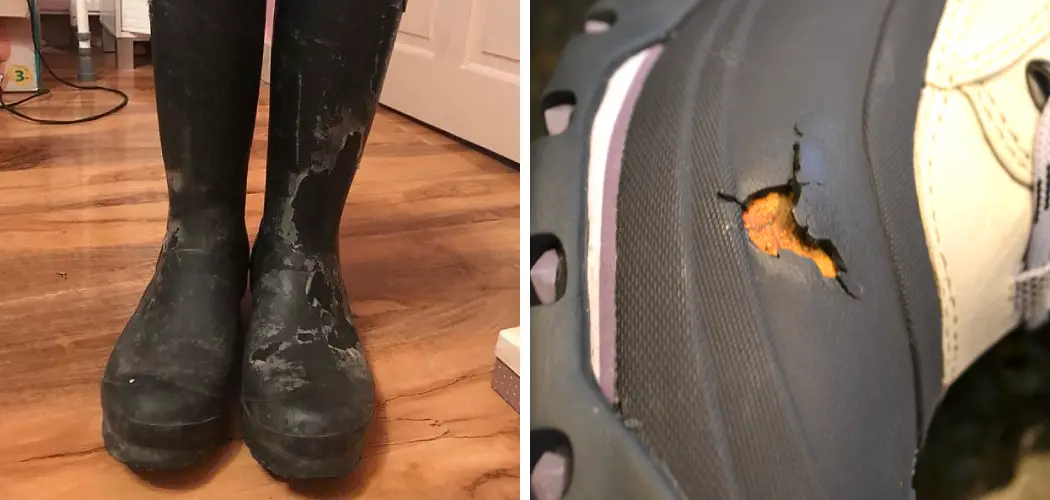If you’re like most people, you probably love wearing rubber boots during the fall and winter months. They are stylish and comfortable, but they also keep your feet warm and dry. However, if you don’t take care of them, your rubber boots can start to crack and deteriorate. In this article, we will discuss some tips on how to keep rubber boots from cracking. Keep reading to learn more.
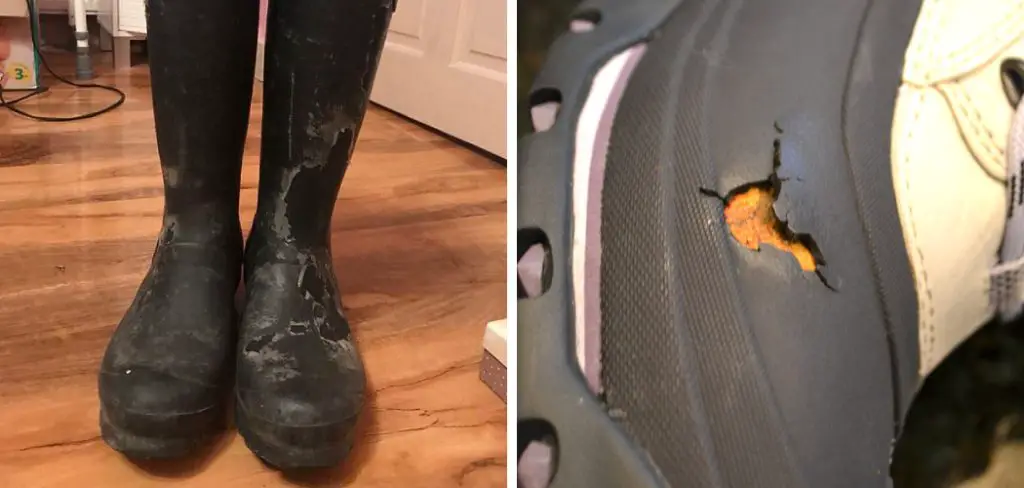
Rubber boots are made of a material called vulcanized rubber, which is a type of latex. This material is solid and durable, but it can become brittle. The main reason rubber boots crack is that they are exposed to extreme temperatures. Many people mistake storing their rubber boots in a cool, dry place during summer. However, this can cause your boots to become brittle and more prone to cracking.
Summary: To keep rubber boots from cracking, you’ll need to clean and store them properly. First, remove any dirt or debris with a damp cloth and let them air dry. Then, apply a rubber sealant or conditioner to protect the boots from environmental factors like sunlight and temperature changes. Finally, store the boots in a cool, dry place away from direct sunlight or heat sources. Avoid folding or creasing the boots, as this can also cause cracking over time.
Why Does Rubber Boots Crack?
Rubber boots are essential gear for many people who work outdoors, but they can be vulnerable to cracks and holes. There are a few reasons why this happens.
First, rubber is a sensitive material that can be damaged by UV rays, heat, and cold. If boots are exposed to extreme temperatures or direct sunlight, the rubber can become brittle and crack.
Second, boots can be damaged by chemicals. If they contact oil, gasoline, or other harsh chemicals, the rubber can degrade and develop cracks.
Finally, if boots are not properly cared for, the glue that holds them together can break down, causing the rubber to separate and crack.
By understanding these factors, you can help prolong the life of your boots and prevent them from developing cracks.
A Detailed Guide on How to Keep Rubber Boots From Cracking
Method 1: Cleaning Your Rubber Boots
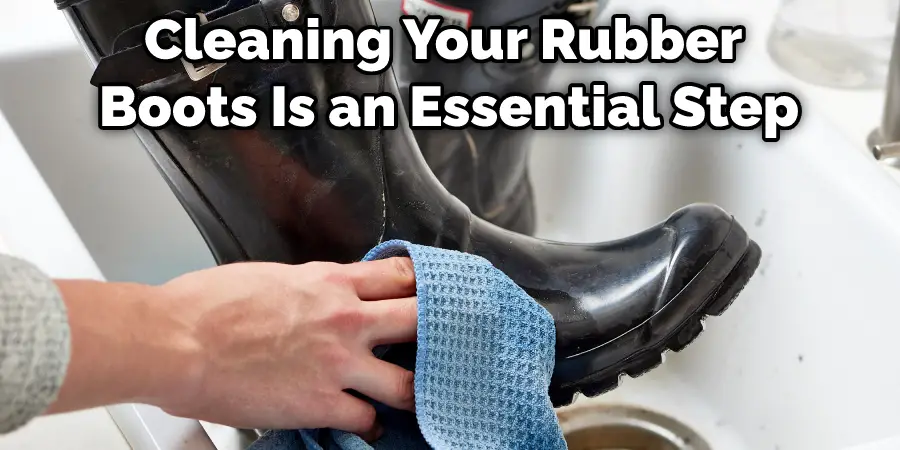
Cleaning your rubber boots is an essential step in helping to keep them from cracking. Dirt and debris trapped on the surface of your shoes can increase the friction between the rubber and other surfaces, resulting in premature wear and cracking.
To clean your rubber boots, start by rinsing them thoroughly with water to remove loose dirt or debris. Next, use a mild detergent or soap specifically for cleaning rubber products to scrub any stuck-on dirt or grime gently. Finally, rinse your boots again with clean water to remove any residue from the detergent or soap, then allow them to air dry completely before wearing them again.
Rubber boots are a must-have for those who live in rainy climates, as they are an excellent way to stay dry and comfortable outdoors. However, if you don’t properly care for your rubber boots, they can crack and become damaged over time.
One of the best ways to keep your rubber boots from cracking is to clean them regularly. This will help remove any dirt or debris trapped inside the boots, which can cause wear and damage over time. Additionally, it’s essential to make sure that you store your rubber boots properly when they aren’t being used. This means keeping them out of direct sunlight and avoiding heavy objects like books or tools that could pressure the material and cause cracking.
With proper care, your rubber boots should last for many years. By following these simple tips, you can help keep your boots in good condition and prevent them from cracking.
Method 2: Applying a Rubber Conditioner
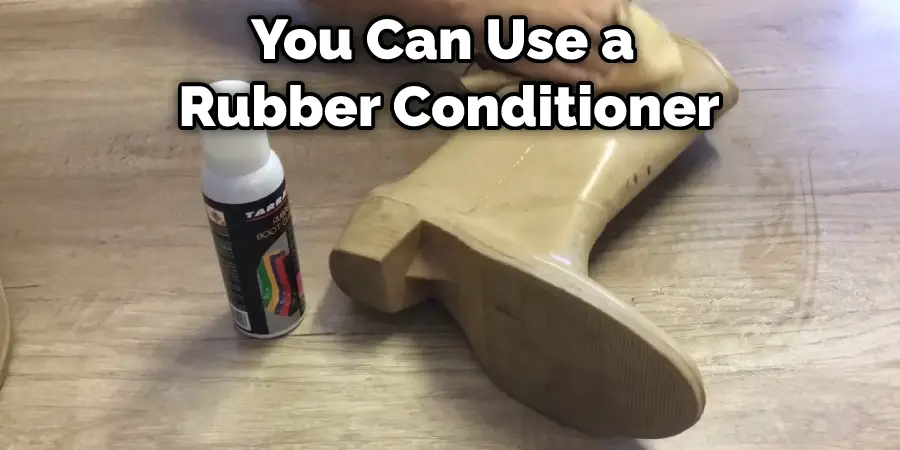
If your rubber boots are already starting to show signs of cracking, you can use a rubber conditioner to help prevent further damage. Rubber conditioners help keep the rubber soft and pliable, making it less likely to crack. You can find rubber conditioners at most hardware stores.
To use a rubber conditioner, apply it to the boot’s surface with a clean cloth. Then, rub the conditioner into the boot until it is evenly distributed. Finally, allow the boot to dry completely before wearing it. You should apply a rubber conditioner to your boots at least once a month to help prevent cracking.
A rubber conditioner is a product that helps protect and extend the life of the rubber. It does this by preventing the drying out and cracking of the rubber. Most rubber conditioners come in a spray bottle. Spray it onto the boots and then rub it in with a cloth. It is best to apply a rubber conditioner every few weeks or so. This will help keep the boots looking like new and prevent any cracking. This is a crucial method in how to keep rubber boots from cracking.
Method 3: Store Your Boots Properly
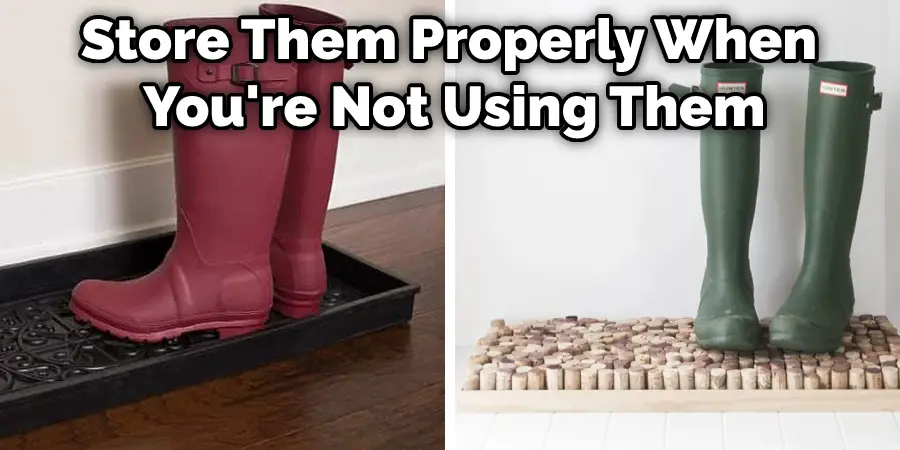
One of the best ways to keep your rubber boots from cracking is to store them properly when you’re not using them. Here are a few tips:
- Store your boots in a cool, dry place. Avoid places that are too hot or too cold, as extreme temperatures can damage the material.
- Keep your boots out of direct sunlight. The sun’s rays can cause the material to degrade over time.
- If possible, store your boots in a dust-free environment. Dust can accumulate on the surface of the boots and cause the material to deteriorate.
- Make sure your boots are completely dry before you store them. Moisture can cause the material to break down and crack.
If you follow these tips, you can help extend the life of your boots and keep them looking new.
Does Polishing Your Rubber Boots Help to Protect Them?
When it comes to keeping your rubber boots in good condition, polishing is an important step that many people overlook. While some may think that simply cleaning or wiping down their boots will be enough to prevent them from cracking and deteriorating, this is not the case. To truly protect your rubber boots and keep them looking new for longer, you need to polish them regularly.
One of the biggest benefits of polishing your boots is that it helps seal in any moisture present within the material. This can help prevent cracking and other damage from occurring over time and keep your boots looking newer for longer. Additionally, polishing your boots regularly creates a barrier between the boot’s surface and any dirt or grime that may accumulate on the exterior.
You will need a good quality polish and a soft cloth or brush to apply it to get started. Begin by cleaning your boots with a damp cloth to remove any loose debris or dirt, then use the polish to cover the entire surface in an even coat. Next, gently buff the surface of the boots to help work the polish into all of the nooks and crannies, paying special attention to areas that tend to collect more dirt or water over time, such as around the toes or heels.
While it may take a bit of time and effort up front, regular polishing is one of the best ways to keep your rubber boots in excellent condition for many years to come. Of course, it will help extend the life of your boots, but it will also keep them looking newer and fresher for longer. So, next time you grab your favorite pair of rubber boots out of the closet, be sure to give them a good polish first!
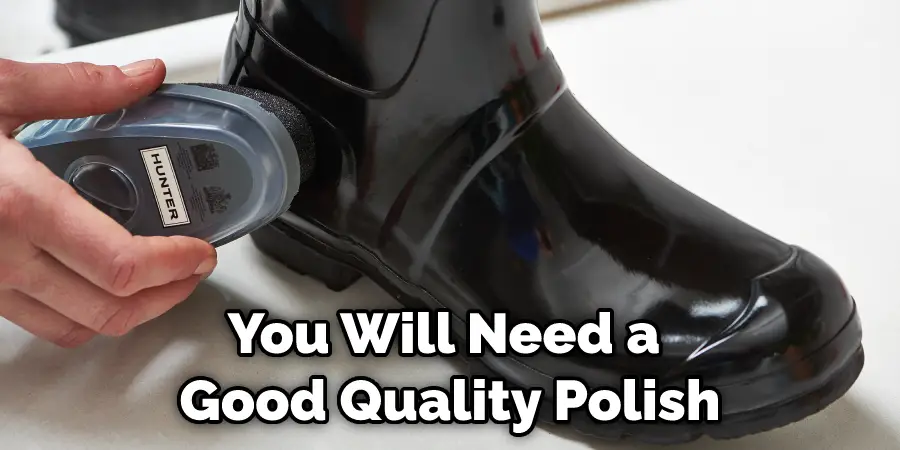
Does Waxing Your Rubber Boots Help to Protect Them?
One of the main concerns that many people have regarding rubber boots is keeping them in good condition and preventing them from cracking. While there are several different methods that you can try, one of the most popular options is waxing your boots. This can help provide an additional layer of protection against cracks and other damage while making it easier to keep your boots clean.
There are a few different ways to go about waxing your boots. One option is to use a commercial boot wax or coating product. These products typically contain high-quality ingredients, such as natural oils, that will work together to create a protective barrier on your boots.
Another option is to use carnauba wax, a type of natural wax commonly used to protect and polish wood surfaces. To do this, apply a thin layer of carnauba wax onto your boots using a soft cloth or brush, and then allow it to dry before buffing it off with another clean cloth.
While waxing your boots can effectively prevent cracks and other damage, it’s important to note that this method isn’t a guaranteed solution. In some cases, you may need to take additional steps such as rotating your boots regularly or applying sealant products periodically to keep them in top condition. However, by following these tips, you can help protect your rubber boots and enjoy them for many years to come.
Frequently Asked Questions
Should I Oil Rubber Boots?
Some people believe that oiling rubber boots can help keep them in good condition and prevent them from weathering and cracking. Others believe that the oil can actually damage the boots and cause them to start splitting at the seams. So, what’s the verdict?
The general consensus seems to be that oiling rubber boots is a good idea, but it’s best to do it sparingly and only when necessary. If you decide to oil your boots, make sure to use a quality oil specifically designed for Outdoor Use.
How Do I Keep My Rubber Soles From Cracking?
Use a good quality shoe polish and oil. Shoe polish is designed to protect the leather against moisture and dryness, while oil helps in preventing damage by inhibiting the growth of bacteria. Additionally, be sure to store your shoes properly by keeping them airtight and out of direct sunlight. And lastly, avoid exposing them to extreme temperatures (above 100 degrees Fahrenheit).
Can You Use Wd 40 on Rubber Boots?
Unfortunately, WD40 cannot be used on rubber boots because it contains an unsafe solvent called 2-butoxyethanol (2-BE). This substance is a carcinogen and can damage the rubber of boots over time. If you must use WD40 on your boots, make sure to apply it in a thin layer and avoid getting it onto your skin or into your eyes.
Is Silicone Spray Good for Rubber Boots?
There is some debate about the effectiveness of silicone spray for rubber boots, but most experts recommend using it sparingly. While silicone spray does help to keep rubber boots waterproof and protect them from dirt and debris, it may also interfere with their ability to breathe. Additionally, silicone spray can evaporate over time, which could leave your boots unprotected against weather extremes.
Conclusion
Rubber boots are a necessary accessory for anyone who lives in a rainy climate, but they can be expensive to replace when they crack. Luckily, there are a few ways to keep them from cracking in the first place. By following these methods on how to keep rubber boots from cracking, you can extend the life of your rubber boots and avoid having to spend money on replacements.
You May Also Read: How to Keep Leather Boots from Cracking

